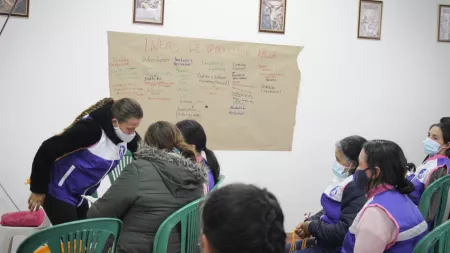Colombia ranks third as a receiving country for migrants and refugees worldwide, after Turkey and Iran. Only for this year 2023, it has been projected, by the R4V platform , that around 402,000 people will be transiting the routes of this South American country and at least 2.9 million people will have a vocation of permanence; Of these, at least 80% would be considered population in need of humanitarian response or socioeconomic integration.
The CARE program in LAC prioritizes work with forcibly displaced populations promoting and protecting their human rights. It is in this context that the focus of the CARE Colombia strategy seeks to guarantee, on the one hand, a comprehensive humanitarian response that saves lives, placing women and girls with sexual and reproductive health and protection needs at the center; and on the other, it promotes sustainable socioeconomic integration scenarios that contribute to the personal and economic empowerment of migrant and refugee women.

The high percentages of Gender-Based Violence (GBV) faced by women and girls and the challenges in the socio-economic integration of women led CARE Colombia to implement, since 2020, the Women Lead in Emergencies (WLiE) program. A process that allows women, in addition to receiving services from the humanitarian response, to strengthen their resilience to recover from situations that affect them and their communities. “Right now we are in the savings group and our dream is to create a micro-enterprise of recyclable material. We want to give many women job opportunities and allow them to be part of the training process," says Luz Angela Vallejo, a participant in the program on the South Western Border of the country, in the Department of Nariño.
Women Lead in Emergencies also focuses its actions on increasing the capacity for individual and collective decision-making; economic empowerment to increase livelihoods and strengthening the voice and leadership of women, adolescents, and populations with sexual orientation, gender identity, gender expression, and diverse sexual characteristics-SOGIESC in formal and informal settings

Catalina Vargas, Country Director of CARE Colombia says that the flows of refugees and migrants will continue to be a growing reality in our contexts, also facing overlapping vulnerabilities. "This is why the response requires an interstate articulation that guarantees the work with the community and a gender approach, recognizing and responding to the particular needs of each group of people," she added.
In the last year, CARE Colombia has attended at least 35,000 people with urgent needs in terms of sexual and reproductive health and protection, has worked with 1,888 women and SOGIESC people who lead their communities in emergency contexts and has contributed to the integration of more of 6,500 migrants and refugees.
